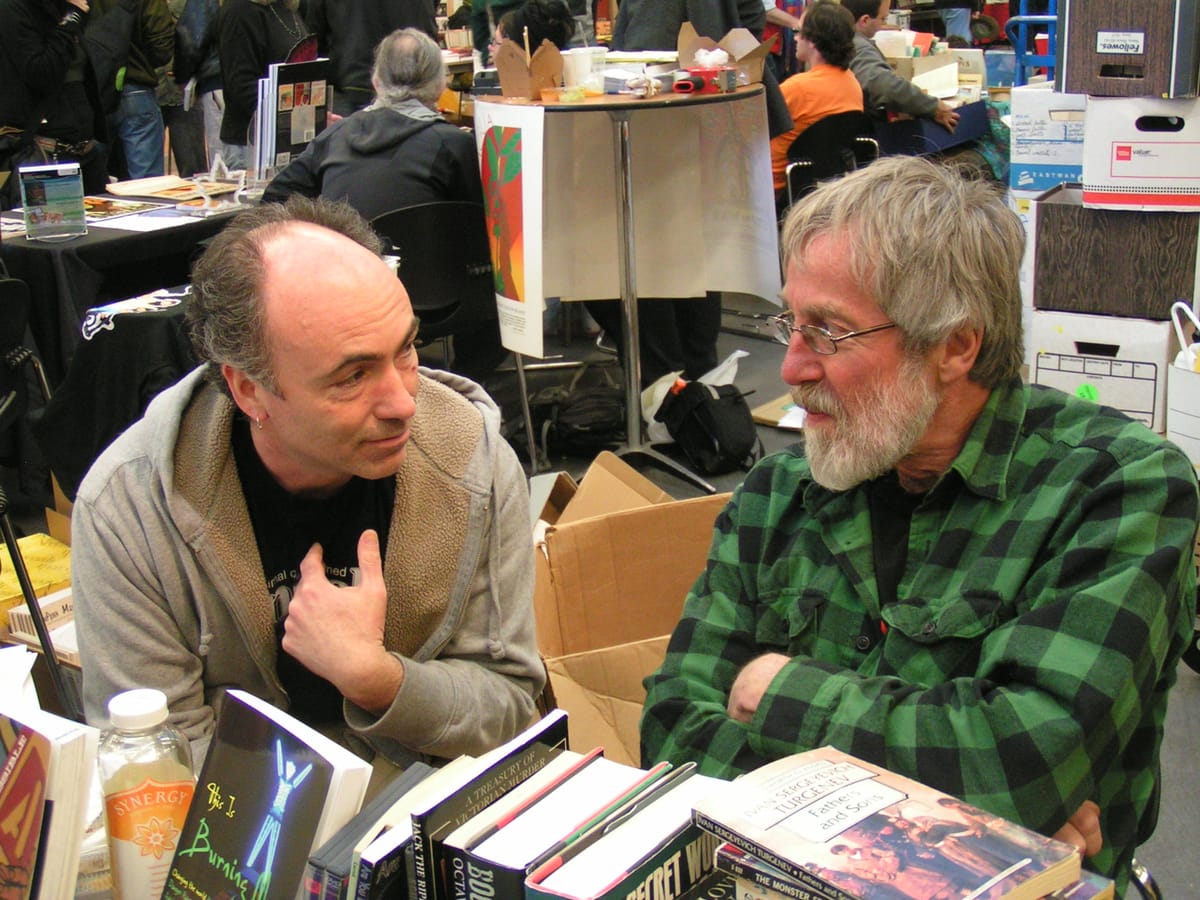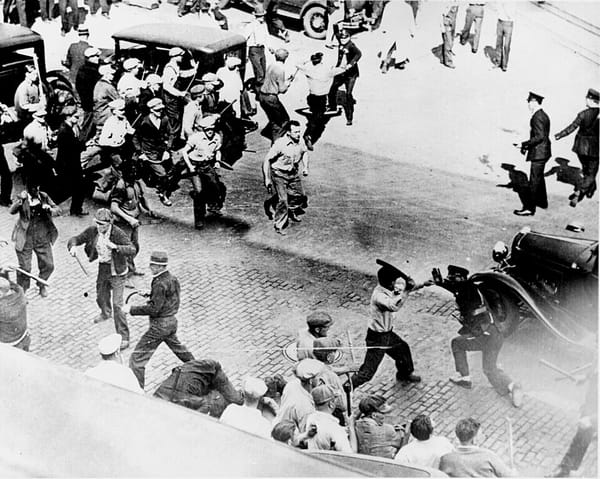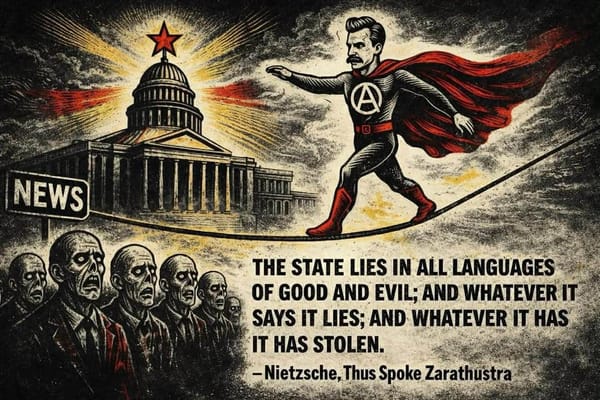Against The Post-Left

1968 was the symbolic year around which there was a world revolution against both Western imperialism and Capitalism as well as the established 'old left' leading 'socialist states', national liberation movements, and social democratic political parties. The 68 rebels not only pointed out the inequalities inherent to capitalist-imperialism, but they pointed out that the old left had failed to successfully dislodge those inequalities at the world level. However, the 68 protest movements were met with fierce repression and the world revolution, like the world revolution of 1848, died without having fundamentally transformed the world-system. In the wake of continuing capitalist-imperialism and the discrediting of the old left by the 68 rebels, those looking for a liberatory alternative to the existing order were left to pick up the pieces both organizationally and ideologically.
While Anarchism never controlled huge swathes of the world the way Marxism-Leninism, traditional national liberation, and social democracy did, it's not like one couldn't launch critiques of the presence in the Anarchist movement of self-defeating bureaucratic structures which mimicked the inequalities of the existing order, rather than challenging them. After all Anarchists had often been guilty of realizing the bankruptcy of state socialist forces too late as in the case of Russian Anarchists supporting the Bolshevik seizure of power and only later coming to criticize it. In the largest experiment in Anarchist social revolution ever carried out the leading Anarchists of the Anarcho-Syndicalist movement during the Spanish Civil War allowed themselves to be bureaucratically integrated into the republican government, becoming Anarchist ministers within a state structure that aimed to undermine the social revolution ultimately beating the working class into submission so that the right-wing forces the republicans were fighting could take over. Beyond Spain, Anarchism, once a movement of millions of workers and peasants around the world, was marginalized by the world wars, fascism, and state socialism.
One could thus count on the same type of critiques made by the 68 rebels of the established old left to be launched against the historical Anarchist movement. Thus there developed a broad milieu under the name "post-left" which came to include thinkers such as Bob Black, John Zerzan, Jason Mcquinn and publications such as CrimeThInc. and Fifth Estate. This variegated group took stock of the failures of the Anarchist tradition and claimed that it needed to be reinvented. The partisans of post-leftism broadly advocate reinventing Anarchism along anti-leftist, anti-civilizational, and anti-organizational lines.
Post-leftists such as Bob Black and Jason Mcquinn point out that the failures of "the left" (a term which I've never seen them attempt to define, but they broadly use to refer to organized social movements guided by attaining an ideal world along socialist lines) occurred in the context of the creation of organizational bureaucracies and stultifying dogmas whose purpose was to control individuals in the supposed name of setting them free. Ultimately the liberatory utopia never comes and remains indefinitely a mirage designed to engineer the consent of the individuals whose lives totalitarian regimes, dogmatic political sects, and institutional management structures dominate. Thus, Anarchism needs to return to its (supposed) roots as an uncompromising doctrine of individual autonomy, where the aim is to free individuals from all external social schemes and ideals. Anarchism should not be an organized social movement dedicated to a class struggle for socialism, but rather a self-theory designed to liberate all individuals from dogmas and institutional confinements.
The individualist strand of post-leftism insists that Anarchy replace Anarchism in the sense that the job of the Anarchist is not to oppose a vision of a post-capitalist society to capitalist reality, but to oppose personal autonomy to all forces, intellectual, or social, that would seek to confine it. Others in the post-left milieu advocate for what has been called Anarcho-Primitivism. Anarcho-Primitivism reimagines Anarchism as a critique not of capitalism and class society, but of "civilization" itself, that is industrial development, large scale infrastructure, mass societies, contemporary science, and advanced technology. Primitivists such as John Zerzan conceptualize "civilization" as a structure of mediations between human beings and nature which goes beyond the type of immediate interactions between nature and human beings in hunter-gatherer societies.
In developing agriculture and sophisticated techniques of production and empirical enquiry human beings put a distance between themselves and their natural environment which require governing institutions that standardize human life. This distance and standardization removed human beings from direct control over their life circumstances and thereby transformed social relations into the sprawling structures of social domination which characterize modern industrial society. Attaining a non-hierarchical society is thereby not a matter of the overthrow of capital and the state and running industrial society through free associations of producers, but to abolish industrial society altogether by reinventing immediate and thus "primitive" ways of life. The individualist strands of the post-left agree with the primitivist strands on the need for a broad critique of industrial civilization, since a modern industrial society places innumerable fetters on immediate personal autonomy but reject "primitivism" as such since it retains the practice of opposing the existing social system to an ideal social order.
The main response to post-leftism by a purported adherent of "anarcho-leftism" (the post-left term of derision for Anarchist Communism and Anarcho-Syndicalism) was Bookchin's pamphlet Social Anarchism or Lifestylism. Bookchin characterized the post-left as a rather vapid obsession with living an iconoclastic lifestyle over building social movements to achieve an alternative to capitalism. This characterization, however, is simplistic. Post-leftists do engage in direct action campaigns and put forward strategies of resistance to the existing order. Both individualist and primitivist strands put forward a critique of the existing order complete with an approach to developing an alternative. It can't honestly be characterized as a mere affinity for alternative living within the status quo.
However, that doesn't mean that the post-left argument goes through, indeed, there is good reason to think that post-leftism is a dead end. Both primitivist and individualist strands have built their critique of anarcho-leftism on a series of mystifications. This is ironic because the whole point of the post-left was to abandon ideologically mystified versions of Anarchism. While Anarchist Communists and Anarcho-Syndicalists obviously need to refine our approach for the 21st century, our post-left critics have decisively failed to motivate their injunction to give up Anarchism for Anarchy.
Individualism
Individualist adherents of the post-left often claim that their doctrine is the core of Anarchism, a root to which Anarchism must return. However, this claim is unfounded. Aside from European terroristic individualism, American Proudhonism, and Stirnerism the mainstream of Anarchism was never dominated by an individualist political philosophy. Anarchists usually refused the typical dichotomy between "individualism" and "collectivism" arguing that the moral center of gravity for human beings is not the society abstracted away from the concrete individuals that make it up, or the individual abstracted away from its social conditions. It is the concrete human individual who is reproduced by a process of social production. This wholistic anthropology can be discerned from the writings of classical Anarchists from Bakunin and Kropotkin to Goldman and Rocker.
In this way the individualist post-left is a retreat from Anarchism as a political philosophy into the delusions of right-wing libertarianism which imagine that human individuals somehow emerge separately from the social conditions that reproduce them. If human beings are social animals who reproduce themselves through social production, and we are, then the claim that any form of social organization which diverts immediate individual autonomy is inherently repressive can't be sustained, unless human survival is to be characterized as repressive. Once this mystification is put to bed there is no longer a basis for thinking that the failures of the old left are reasons to abandon 'anarcho-leftism'.
The question is not whether human existence can somehow persist in a purely atomistic state of constant immediate individual autonomy, but how to organize society in such a way that the institutions which mediate individual autonomy become expressions of the concrete self-activity of real human individuals. Since post-left individualists and right-wing libertarians share an atomistic view of human individuals, they both seem to reject the very possibility of positive freedom. Positive freedom is the type of freedom you have when you have direct control over your own circumstances. Positive freedom is thus about the social contexts which allow you access to social wealth.
Negative freedom is merely not being directly coerced. While right-wing libertarians openly declare that their doctrine is incompatible with positive freedom, post-left individualists do not say this much openly. However, without social relations and institutions which mediate the immediate autonomy of individuals there can be no production and distribution of social wealth and thus no positive freedom. What right-wing libertarians and some liberals fail to realize is that positive freedom is the necessary precondition of negative freedom. Coercion is the necessary consequence of the monopolization of social wealth.
Primitivism
Primitivists claim that hunter-gatherers had an unmediated relationship to nature in which there was no techno-productive infrastructure which determined their experience of and access to their environment. This is a simply false and in fact somewhat racist claim. All human societies develop tools and productive techniques that mediate their relationship to the natural environment. Hunter-gatherers did thus not live in naive and simple "immediacy".
Thus, the entire primitivist edifice is built on a mystification of indigenous people's lives. In fact, the extent to which human beings fail to mediate nature is the extent to which nature mediates us. Although hunter-gatherers lived in egalitarian societies, their ability to be part of a freely associated human community was harshly limited by familial and territorial ties. There is a reason that primitivists have never directly replied to the accusation that their program requires the annihilation of a significant part of earth's 8 billion strong population (the most common reply is that this is a wash because civilization also kills people).
It's clear that the development of the productive forces is built into the human struggle for freedom. These developments produce the kind of social wealth that can reduce the working day and facilitate the extension of life and leisure. Primitivists only respond to these points by unimaginatively pointing out that capitalist civilization has failed to dedicate the productive forces to this task. The fact that this is the very point of communism somehow illudes them.
Anarcho-Leftism Unrefuted
Mcquinn and his comrades insist that anarcho-leftism is incredibly lame, a discredited historical role play. But did they even understand it in the first place? Post-left individualists seem to think Communist Anarchism and Anarcho-Syndicalism are equivalent to Murray Bookchin's vision of local democracy, but they aren't. Bookchin eventually left the Anarchist movement because he realized that his grafting of Anarchist federalism on to broadly radical liberal ideas of democratic obligation among citizens and local councils crafted out of municipal state structures was not compatible with it. Bookchin also repudiated syndicalism because he was bent on voiding "social Anarchism" of its basis in class struggle.
Classical Anarchist Communists such as Goldman and Wilson emphatically denied that majoritarian conformism is compatible with freedom, that merely giving the majority the ability to command individuals wouldn't be just another form of oppression. Malatesta, when addressing the economic disagreements among Anarchists, made sure to stress that any Anarchist mode of production, including the communism he supported, could only derive its legitimacy from freedom to associate and disassociate. The writings and declarations on libertarian communism produced by the Spanish Anarcho-Syndicalist movement that made the social revolution in Spain maintained that all the confederal organizations of the movement and the new society it would produce would maintain the right of disassociation for both individuals and collectives. Clearly Communist Anarchism is not just self-managed mob rule.
Primitivists have routinely characterized Communist Anarchism and Anarcho-Syndicalism as merely taking the poisonous, centralized, state supported, industrial edifice of capitalist society and putting it in the hands of the workers. However, this has never been the popular conception in the movement. Kropotkin's communism, the most influential conception, called for the decentralization of productive infrastructure, the disappearance of the urban/rural divide, and the abolition of the division of labor. In the 20s the popularity of scientific methods of production management led some Anarcho-Syndicalists to argue for the preservation of the scientific and technological infrastructure of capitalism after the social revolution to be run by the workers themselves.
However, this produced a movement debate in which other Anarcho-Syndicalists insisted on the devolution of productive infrastructure among a network of communes and argued that any form of Anarcho-Taylorism would simply reproduce capitalist relations. So, most of the time Anarchists have not advocated merely grafting capitalist productive mechanisms on to communism, and when they have, other Anarchists have pushed back. Anarchists should indeed be vigilante against conformist politics and reproducing hierarchical social relations and modes of thought. Rather than helping this cause the post-left has merely ignored the many earnest attempts by Anarchists to do this.
Post-Leftism: Nothing To See
Post-leftism is a symptom of the post-68 condition in radical circles. In the wake of 68 radicals have tried their best to learn from the 20th century but have most often fallen into a heap of mystification. Contrary to what many of the post-68ers contend abandoning the organized class struggle for a better society won't allow them to escape the shadow of the old left. The point of 68 was that the failure of the old left was its inability to see that struggle through to the end. Abandoning it in favor of fantasies about total immediate individual autonomy or ecologically unmediated states of existence is simply to make oneself more irrelevant than those you critique.
Sources
Post-Left Anarchy, Mcquinn
Notes On "Post-Left Anarchism", Black
A Dialog on Primitivism, Jarach and Zerzan
Why I'm Not a Primitivist, Mcquinn
Future Primitive, Zerzan
Agriculture, Zerzan
The Incredible Lameness of Left Anarchism, Mcquinn
World-Systems Analysis: An Introduction, Wallerstein
Social Anarchism or Lifestylism, Bookchin
Bookchin Breaks with Anarchism, Biehl
Democracy or Anarchy, Wilson
Women Suffrage, Goldman
Anarcho-Syndicalism In The 20th Century, Damier
Individualism and Communism in Anarchy, Malatesta
Conquest of Bread, Kropotkin
Politics, Tansey and Jackson
The Anarchist Individualists, Graham
Standford Encyclopedia of Philosophy: Libertarianism





